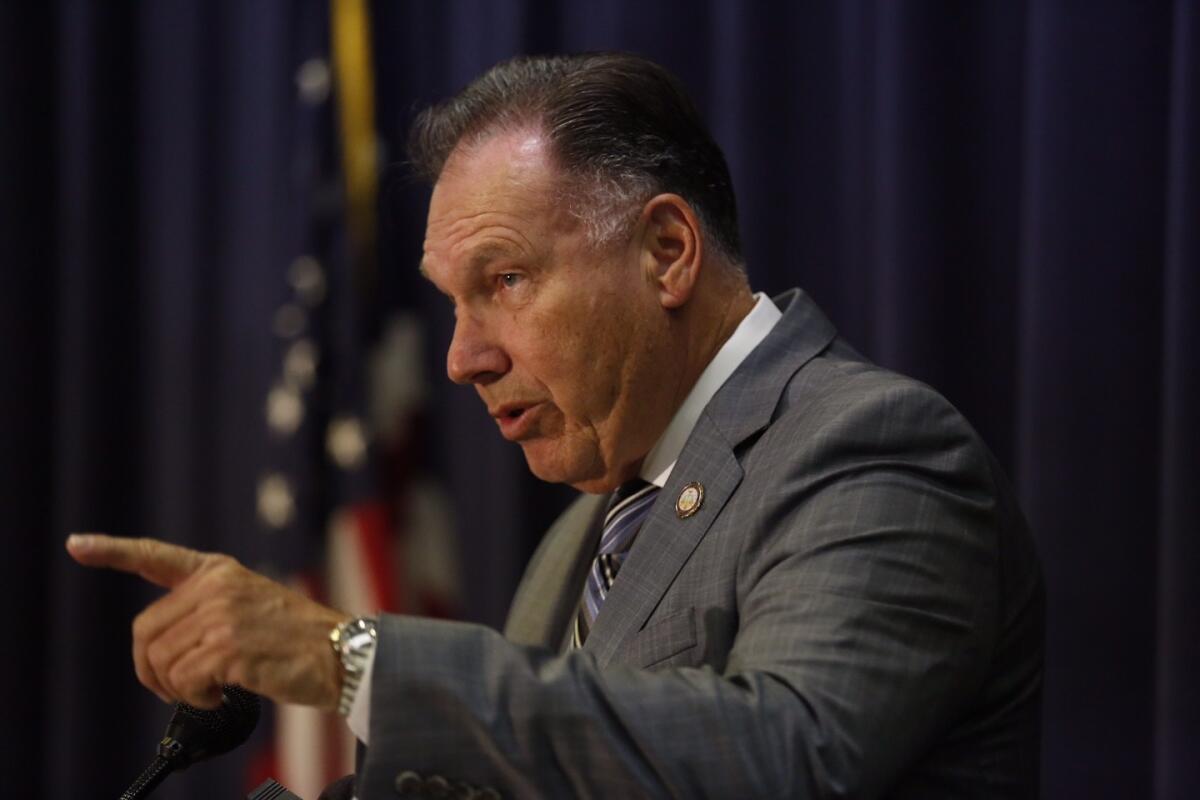Prosecutors who withhold or tamper with evidence now face felony charges

- Share via
Amid an ongoing controversy in the Orange County courthouse involving accusations of prosecutorial misconduct, a new law will ratchet up penalties for California prosecutors who tamper with evidence or hide exculpatory material from the defense.
Under the law, which was introduced by Assemblywoman Patty Lopez (D-San Fernando) and signed by Gov. Jerry Brown on Friday, a prosecutor can receive up to three years in prison for altering or intentionally withholding evidence that defendants might use to exonerate themselves. Previously, those acts were considered misdemeanors.
For the record:
4:48 p.m. April 17, 2025An earlier version of this article said the California District Attorneys Assn. opposed a bill making it a felony for prosecutors to falsify or hide evidence. The group initially opposed the measure but took a neutral position on the final version.
“I hear so many stories about innocent people across California, and across the country, who have been wrongfully convicted,” Lopez said. “I just hope that when people think the rules don’t apply to them, they will think twice before they abuse their power.”
Lopez said the legislation was not specifically inspired by events in Orange County. However, the controversy surrounding the office of longtime Dist. Atty. Tony Rackauckas spurred the bill’s advocates and informed the debate on the state Senate floor.
In March 2015, Orange County Superior Court Judge Thomas Goethals removed Rackauckas’ office from one of its most high-profile cases, the prosecution of mass murderer Scott Dekraai. The judge said prosecutors repeatedly had violated Dekraai’s rights by failing to turn over evidence, though he did not find they had engaged in willful misconduct.
The California attorney general’s office, which has inherited the case, is appealing Goethals’ ruling.
Dekraai’s attorney, assistant public defender Scott Sanders, has argued that Orange County jailers have flouted inmates’ rights for years with an illegal jailhouse-informant program, and that prosecutors consistently have tried to conceal it.
The scandal, which has drawn nationwide attention, has resulted in the collapse of cases against numerous criminal defendants.
Susan Schroeder, Rackauckas’ chief of staff, said her boss had supported the evidence-falsifying bill from “very early on,” adding: “He believes all prosecutors should follow the law.”
However, she said, Rackauckas believes the law should be extended to defense attorneys who intentionally withhold evidence. She said it would not have applied in the Dekraai case, and pointed to Goethals’ ruling, which found no proof that prosecutors intentionally hid evidence.
In August, the state Senate voted 36 to 1 in favor of the bill. The lone no vote came from Sen. John Moorlach (R-Costa Mesa), whose district covers much of Orange County. In a speech on the Senate floor, Moorlach noted the bad publicity that has enveloped Rackauckas in recent years.
“If you read his press clippings, you become pretty happy real quick that you don’t have him,” Moorlach said. “Bottom line, I think he’s lucky he’s an elected official, because it’s just too expensive to recall and replace” him, he said.
Announcing his opposition to the bill, however, Moorlach said he believed that it was “just a tad too severe” in calling for felony penalties against prosecutors.
In an interview Monday, Moorlach said he was very disturbed by the possibility that Dekraai — who murdered his ex-wife and seven others at a Seal Beach salon in 2011 — might avoid the death penalty as a result of missteps by jailers and prosecutors. “They deserve justice,” he said of the victims’ families.
“I think at the end of the day, the lawyers in the Orange County D.A.’s office want to do what’s right. I’m giving them the benefit of the doubt,” Moorlach said.
Among the bill’s advocateswas Obie Anthony, 42, who served 17 years behind bars after being convicted in 1995 of a murder outside a South Los Angeles brothel. He was exonerated in 2011 after it was revealed that a key prosecution witness, a pimp, had received leniency in exchange for his testimony — a deal prosecutors had not disclosed.
“I’m glad the governor decided to put his foot down,” said Anthony who told his story to California lawmakers as they weighed whether to support the bill.
“I went to talk to them about how those bad-acting prosecutors took 17 years of my life,” said Anthony, who now lives in Missouri and runs a nonprofit organization, Exonerated Nation, for the wrongfully convicted.
Matthew Guerrero, president of the California Attorneys for Criminal Justice, a legislative advocacy group that pushed for the law, said the Orange County scandal “really invigorated our organization to recognize that there’s a problem.”
“The prosecution in that situation seemed to be acting with impunity,” Guerrero said. “So we wanted to send a strong signal that the criminal justice system needs to do the right thing in the right way.”
The California District Attorneys Assn. initially had opposed the bill but took a neutral position on the final version.
christopher.goffard@latimes.com
Twitter: @LATchrisgoffard
ALSO
Negligence lawsuit against former Rep. Duncan Hunter is dismissed
Woman reports rape at Stanford on day Gov. Brown signed law inspired by Brock Turner case
In a first for San Bernardino, heightened earthquake risk temporarily closes City Hall
More to Read
Sign up for Essential California
The most important California stories and recommendations in your inbox every morning.
You may occasionally receive promotional content from the Los Angeles Times.











